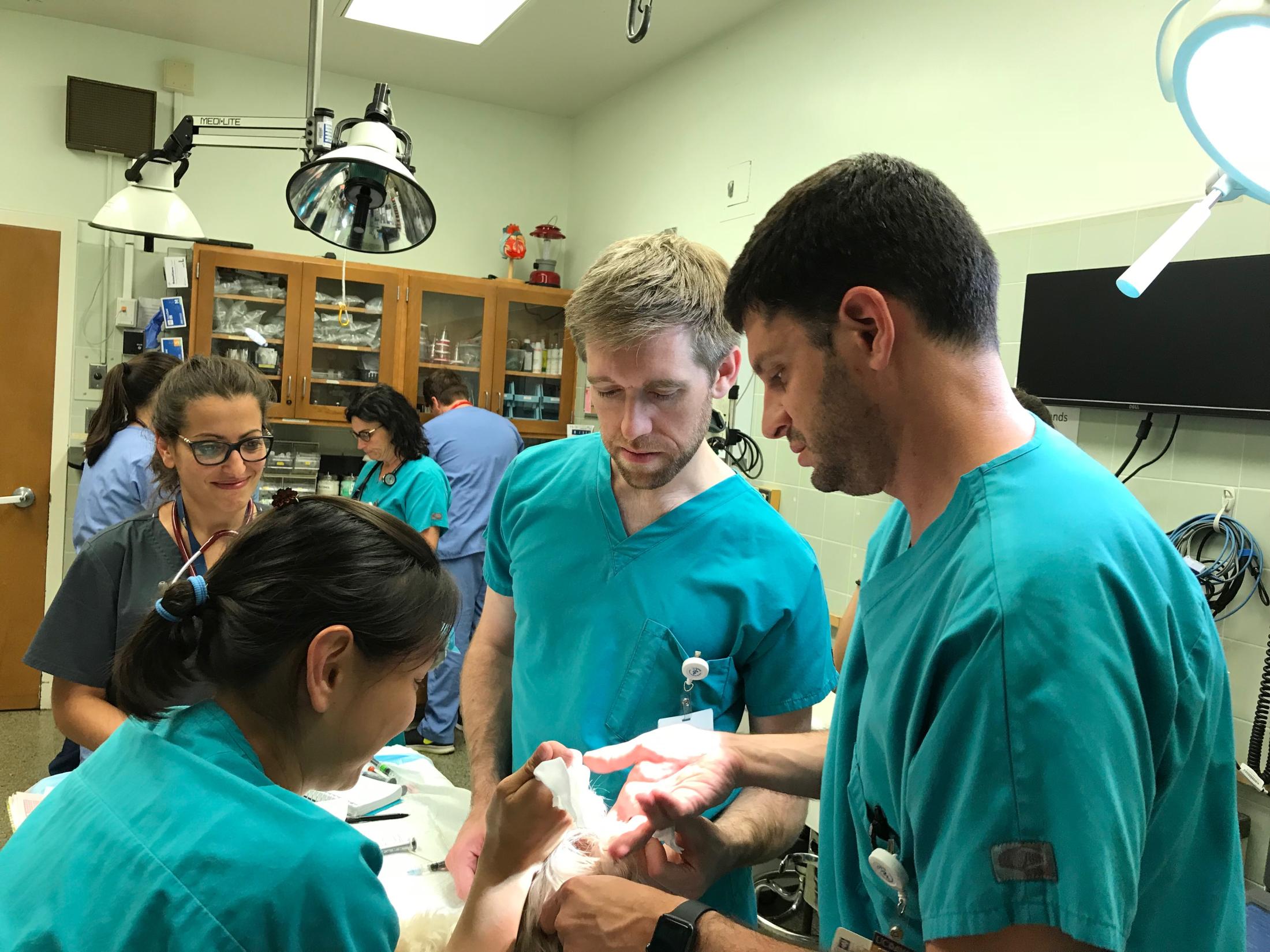
Small Animal Emergency Medicine Specialty Internship
Objectives of the program:
This program is a twelve-month specialty internship in emergency medicine designed for clinicians who have already completed at minimum a one-year rotating internship (or equivalent practice) after veterinary school graduation.. The primary objective of this program is to train individuals to be excellent emergency clinicians with a focus on the development of critical thinking skills. Our large emergency caseload exposes our specialty interns to a wide variety of cases with ample opportunity to observe and participate in cutting-edge veterinary medicine. It is excellent training for future residents as well as for those seeking a career in emergency medicine.
Clinical and Teaching Responsibilities:
The majority of the clinical commitment is after-hours emergency receiving. While on clinic duty the emergency intern receives emergency cases and provides immediate stabilization and diagnostic procedures. The intern is responsible for the entire case management of mild and moderately ill patients, while severely ill or injured patients are managed with the assistance of an Emergency and Critical Care (ECC) resident and/or faculty member. An ECC resident and faculty member are available as backup at all times. Interns are responsible for professional client communications, timely referring veterinarian communications, and maintenance of high-quality medical records. Most patients are transferred at the end of each shift. The intern will maintain primary case responsibility for some patients for the duration of their hospitalized period. The after-hours emergency service is supported by numerous other specialty services including neurology, cardiology, anesthesia, surgery, diagnostic imaging, internal medicine, and ophthalmology.
The VMTH Small Animal Emergency Service provides primary care for the local population and accepts numerous referrals from other veterinary facilities over a wide region. As a result, our service manages a broad range of medical and surgical diseases. These include primary trauma and intoxications, complex medical conditions, neurologic emergencies, as well as referrals for hemodialysis or mechanical ventilation. On all shifts, the intern works with 2-3 trained technicians, and works with and mentors clinical-year veterinary students. The intern provides clinical teaching and evaluation of these veterinary students on a regular basis.
Mentorship:
The first 4 weeks of the internship are directly and completely mentored by ECC faculty, ER staff veterinarians, and ECC residents; the intern must attend all shifts during this orientation period unless they are ill. In addition, interns work alongside other emergency veterinarians (residents, staff veterinarians) for ~25% of ER receiving hours and under the direct supervision of a Diplomate of the American College of Veterinary Emergency and Critical Care for ~25% of their ER shifts throughout the year. Interns attend journal club and topic-based intern rounds weekly.
Interns are also encouraged to attend weekly resident rounds when clinical schedule allows. Four weeks of the intern’s year will be scheduled as professional development during which the intern can choose to spend time in ICU, rotate with other specialty services in the VMTH, attend continuing education, or pursue a research project. Twenty-four days of vacation will be provided per 12 months. Clinic duty on some University holidays is required.
Course of activities:
There will be up to 4 interns selected annually who will share a rotating schedule.
- Approximately 25 weeks on overnight emergency receiving, either 3 or 4 nights / week
- Approximately 18 weeks on day or swing shifts with overlap with senior clinicians and residents, either 4 or 5 days / week
- 4 weeks of Professional Development
- 5 weeks of Vacation
House officers in the SA ECC service have a dedicated, shared meeting room as well as a dedicated break room. There is access to numerous shared computer terminals throughout the hospital and extensive digital libraries of relevant textbooks and journals readily available. The University has full online access to many medical resources including PubMed, Cab Abstracts, and Web of Science. The facilities and resources for research opportunities are extensive.
ACVECC Diplomates participating in the program: Jamie Burkitt, Steve Epstein, Kate Farrell, Sabrina Hoehne, Kate Hopper, Karl Jandrey, Helen Philp
All faculty are involved in the clinical training of all interns. For 2023-24, Dr. Burkitt is the director of the internship program and provides primary mentorship for the interns. Performing a research project is optional for interns and faculty will provide mentorship for research endeavors.
Process of evaluation: Interns receive 2 evaluations (written and verbal) during the program at 4 and 10 months. If indicated more frequent evaluations may be performed. If the performance of an intern is considered inadequate, they will receive written letters of warning describing the concerns and what is required to rectify them and in what time frame. If these performance issues are severe, the intern will be informed that failure to improve could result in termination from the program.
Path following our Internship: Most of our ER Specialty interns who seek residency or other advanced training following our ER Specialty internship are successful in this pursuit. Please see the www.virmp.org description of our ER Specialty Internship for this year’s data.
Please note: Candidates should be US citizens, US permanent residents, or foreign nationals eligible for a J1 scholar visa (and at the time of application not be subject to holds, bars, or in-country rules) or Canadian/ Mexican citizens eligible for a TN visa. We will not pursue other visa categories. Candidates must pay for their visa fees. The offer of an internship may be withdrawn if written evidence of a visa is not provided by June 1, 2024.
https://siss.ucdavis.edu/scholars_depts/j_visa/index.html
Certification: A certificate of successful completion is awarded at the end of the internship.
Application is through the VIRMP at www.virmp.org and invited Zoom or Skype interview is required for consideration. Applicants selected for an interview will be contacted by Dr. Jamie Burkitt by email.
